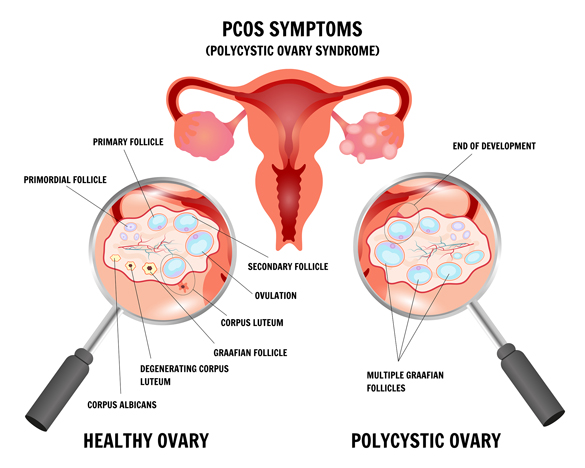
PCOD & PCOS: Causes, Symptoms & Treatment
Understanding PCOD and PCOS
Polycystic Ovarian Disease (PCOD) and Polycystic Ovarian Syndrome (PCOS) are common hormonal disorders affecting women of reproductive age. While these terms are often used interchangeably, they have distinct characteristics.
PCOD (Polycystic Ovarian Disease): A condition where the ovaries produce immature eggs, leading to cyst formation. It usually doesn’t cause severe hormonal imbalances.
PCOS (Polycystic Ovarian Syndrome): A more severe condition that leads to significant hormonal disturbances, affecting metabolism and overall health.
Causes of PCOD and PCOS
The exact cause of PCOD and PCOS is unknown, but several factors contribute to their development:
Genetics: A family history of PCOD/PCOS increases the risk.
Insulin Resistance: Excess insulin in the body leads to increased androgen (male hormone) production.
Lifestyle Factors: Poor diet, lack of physical activity, and obesity contribute to hormonal imbalances.
Hormonal Imbalance: Elevated levels of androgens and irregular ovulation are common causes.
Common Symptoms of PCOD and PCOS
Women suffering from PCOD or PCOS may experience:
Irregular or missed periods
Excessive hair growth (hirsutism)
Acne and oily skin
Weight gain or difficulty losing weight
Hair thinning or hair loss
Mood swings and depression
Difficulty in conceiving
Health Risks Associated with PCOS
If left untreated, PCOS can lead to:
Type 2 Diabetes
High Blood Pressure
Infertility
Heart Diseases
Endometrial Cancer
Effective Treatment for PCOD and PCOS
While there is no definitive cure, managing PCOD/PCOS with lifestyle changes and medical treatments can help significantly.
1. Lifestyle Modifications
Balanced Diet: A low-carb, high-protein diet helps regulate insulin levels.
Regular Exercise: At least 30 minutes of daily exercise can reduce insulin resistance and aid weight management.
Stress Management: Yoga, meditation, and mindfulness can help in balancing hormones.
2. Medical Treatments
Birth Control Pills: Regulate menstrual cycles and reduce androgen levels.
Metformin: Helps in insulin regulation and weight management.
Fertility Treatments: Medications like Clomiphene and assisted reproductive techniques for women trying to conceive.
Hormone Therapy: Helps in managing symptoms like excessive hair growth and acne.
3. Natural Remedies
Spearmint Tea: Known to reduce androgen levels and control excessive hair growth.
Apple Cider Vinegar: Helps in managing blood sugar levels.
Cinnamon: Aids in regulating menstrual cycles.
Conclusion
PCOD and PCOS are manageable conditions with the right approach. Early diagnosis, a healthy lifestyle, and medical support can help in leading a normal, healthy life. If you experience any symptoms, consult a healthcare provider for a proper treatment plan.
???? Stay informed, stay healthy!
#PCOSAwareness #PCODTreatment #WomenHealth #HormonalBalance #HealthyLiving
